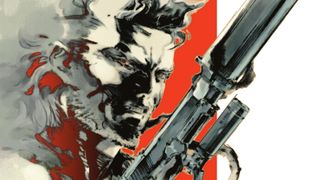Hideo Kojima says Metal Gear Solid 2 had to make 300 changes and was almost cancelled in the wake of the September 11 terrorist attacks
A sequence where a Metal Gear attacked New York was almost completely removed.

Hideo Kojima recently gave an interview to the magazine Weekly Tokyo Keizai, in which he talked a little about the run-up to the release of Metal Gear Solid 2 and how real-world events almost scuppered the game's release. At the time MGS2 was probably the most anticipated game in the world, and was due to release in November 2001. Then two months before the game's release, the September 11 terrorist attacks happened, killing just under 3,000 people and changing the course of the world.
MGS2, which featured terrorist factions attacking New York, was suddenly a project with very bad timing indeed. Kojima and Konami went into crisis mode, with Sony also involved, realising that it simply could not release the game as-was in this context. Particular scenes, such as Arsenal Gear crashing into Manhattan and collapsing various buildings, were now unthinkable (the bookends of this scene survive, but what happens in-between is left to the player's imagination).
"The depiction of [the] game's themes and its numerous similarities with the real-world events on September 11 rendered it unfit for release at the time," said Kojima (thanks, GR+). "After consulting with lawyers, the end result was that the game required revisions in 300 spots. It goes without saying that we were in crisis mode and it was threatening the release and sale of the game."
Kojima had to go into a meeting with Konami's senior management and explain the contents of MGS2's story and scenario: "Everyone's facial expression had a look of 'this is not good'."
The director's first instinct was that "the game shouldn't be released at this period in time" and, further to that, "I have no other choice but to take responsibility and resign from the company."
Into this came Sony Computer Entertainment president Ken Kutaragi, who pointed out to Kojima that he was hardly in control of real world events and should not hold himself responsible: "this is not a matter you should be ashamed of," said Kutaragi. "You should go ahead and release the game."
"[I also] reached out to Kagemasa Kozuki, the founder of Konami through email," said Kojima. "He responded with, 'I have made up my mind. The game should be released. What are your thoughts?' I was moved by the words and I too made up my mind."
The biggest gaming news, reviews and hardware deals
Keep up to date with the most important stories and the best deals, as picked by the PC Gamer team.
The game's release was ultimately delayed by a few weeks while the developers worked to change what needed changing, and ultimately launched on November 13, 2001.
Kojima has recently been reminiscing about the Metal Gear games, before this lamenting that MGS4's digital battlefield "is no longer science fiction". There was also the oddity of the parallels between Death Stranding and the subsequent global pandemic which, Kojima says, meant he re-wrote the upcoming sequel entirely.
Rich is a games journalist with 15 years' experience, beginning his career on Edge magazine before working for a wide range of outlets, including Ars Technica, Eurogamer, GamesRadar+, Gamespot, the Guardian, IGN, the New Statesman, Polygon, and Vice. He was the editor of Kotaku UK, the UK arm of Kotaku, for three years before joining PC Gamer. He is the author of a Brief History of Video Games, a full history of the medium, which the Midwest Book Review described as "[a] must-read for serious minded game historians and curious video game connoisseurs alike."
Most Popular





